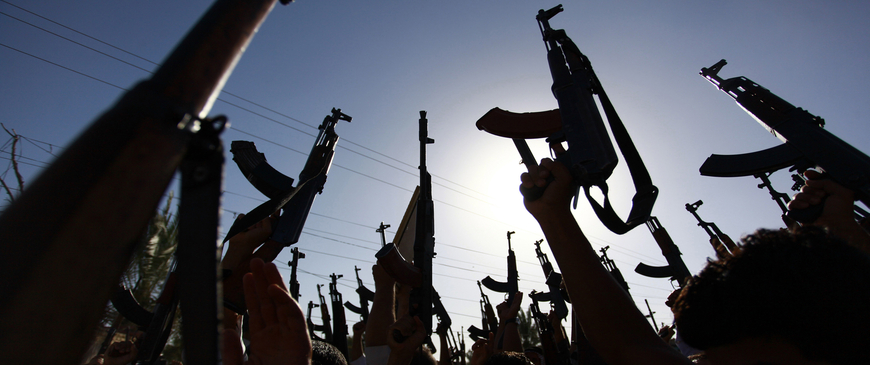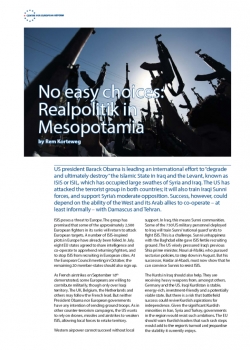
No easy choices: Realpolitik in Mesopotamia
US president Barack Obama is leading an international effort to "degrade and ultimately destroy" the Islamic State in Iraq and the Levant, known as ISIS or ISIL, which has occupied large swathes of Syria and Iraq. The US has attacked the terrorist group in both countries; it will also train Iraqi Sunni forces, and support Syria’s moderate opposition. Success, however, could depend on the ability of the West and its Arab allies to co-operate – at least informally – with Damascus and Tehran.
ISIS poses a threat to Europe. The group has promised that some of the approximately 2,500 European fighters in its ranks will return to attack European targets. A number of ISIS-inspired plots in Europe have already been foiled. In July, eight EU states agreed to share intelligence and co-operate to apprehend returning fighters, and to stop ISIS from recruiting in European cities. At the European Council meeting in October, the remaining 20 member-states should also sign up.
As French airstrikes on September 18th demonstrated, some Europeans are willing to contribute militarily, though only over Iraqi territory. The UK, Belgium, the Netherlands and others may follow the French lead. But neither President Obama nor European governments have any intention of sending ground troops. As in other counter-terrorism campaigns, the US wants to rely on drones, missiles and airstrikes to weaken ISIS, allowing local forces to retake territory.
Western airpower cannot succeed without local support. In Iraq, this means Sunni communities. Some of the 750 US military personnel deployed to Iraq will train Sunni ‘national guard’ units to fight ISIS. This is a challenge. Sunni unhappiness with the Baghdad elite gave ISIS fertile recruiting ground. The US wisely pressured Iraq’s previous Shia prime minister, Nouri al-Maliki, who pursued sectarian policies, to step down in August. But his successor, Haidar al-Abadi, must now show that he can convince Sunnis to resist ISIS.
The Kurds in Iraq should also help. They are receiving heavy weapons from, amongst others, Germany and the US. Iraqi Kurdistan is stable, energy-rich, investment-friendly and a potentially viable state. But there is a risk that battlefield success could revive Kurdish aspirations for independence. Given the significant Kurdish minorities in Iran, Syria and Turkey, governments in the region would resist such ambitions. The EU should warn Kurdish leaders that such rash steps would add to the region’s turmoil and jeopardise the stability it currently enjoys.
Unfortunately, pushing ISIS out of Iraq is not enough; its sanctuary in Syria must be removed. The group emerged as an effective force fighting the regime of Bashar al-Assad in Syria’s civil war. With US military strikes, Syria’s imbroglio has become even more complex. The US wants both to defeat ISIS and unseat Assad. So instead of working with Damascus, the US hopes to train and equip 5,000 moderate rebels. Previously, however, US-backed groups have been defeated, or weakened by infighting. And opposition groups may not want to shift from fighting Assad to fighting ISIS.
A complicating factor is Saudi Arabia’s competition with Iran for influence in the region. Riyadh is worried about ISIS and its claims on Mecca and Medina, but equally about Iran’s support for Assad. By giving Saudi Arabia a role in training moderate rebels, the US hopes it will stop backing Sunni extremists in Syria. Unless the moderate opposition alone can keep the pressure on Assad, this is wishful thinking.
On the other side of the conflict, Iran will continue to prop up Assad. Tehran is not part of the US-led coalition, but ISIS is a sworn enemy of its allies in Baghdad and Damascus. Iran’s revolutionary guard already backs Iraq’s volunteer Shia militias and Syria’s military. The West should reach out to Tehran to co-ordinate some military and humanitarian operations. This may be politically easier for EU countries to do than the US; British prime minister David Cameron recently met Iranian president Hassan Rouhani in the margins of the UN General Assembly in New York. For now, Tehran is playing hard to get, trying to link its help against ISIS to Western concessions on nuclear issues. Europe and the US must firmly resist this.
Syrian airspace, unlike Iraqi, remains formally closed to an anti-ISIS coalition, blocking European action over Syria. Russia will not agree to a UN Security Council mandate against Syria’s will, either. But ‘realpolitik’ has made the US and Assad strange bedfellows; Damascus was given advance warning of, and silently acquiesced to, US airstrikes against ISIS and the Khorasan Group (an Al Qaeda offshoot) in Syria on September 23rd. This may be a formula Europeans can also live with.
Jordan and some Gulf states supported these US strikes. This is encouraging; their participation helps convince sceptical Sunni Arab audiences that the fight against ISIS is not sectarian. But the attacks may drag the region and the US deeper into Syria’s civil war.
Given regional complexities and the Western mantra of ‘no boots on the ground’, there are now two options, neither of them good. The West could attempt to contain ISIS inside Syria, risking further attacks by ISIS in neighbouring countries. Or the West could try to defeat ISIS altogether, but then it must find a way to work with Tehran and Damascus.
Rem Korteweg is a senior research fellow at the Centre for European Reform.

